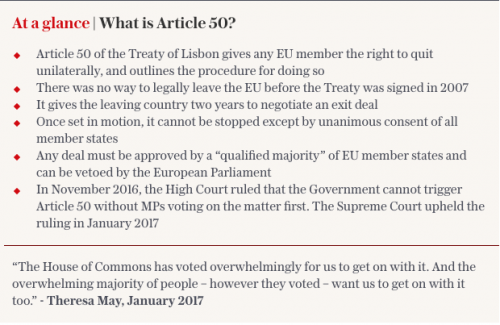Merkel, Hollande Push Back Against Theresa May & Brexit

Back in October, German Chancellor Angela Merkel and French President Francois Hollande warned British Prime Minister Theresa May that the United Kingdom might face a tough time leaving the European Union.
Those warnings have come to fruition a day after the UK delivered the official Brexit letter to the EU. Merkel and Hollande demanded to May “that Brexit negotiations must deal with how Britain will leave the bloc” before the countries even think about future negotiations.
Before I go into detail about the phone calls, remember that no one really knows what will happen next because this has never happened before. Article 50 in the Lisbon Treaty allows member countries to leave the EU after two years of negotiations. If the country and the EU cannot reach an agreement then the country leaves without anything. Here’s a handy picture from The Telegraph:
Theresa May
Several newspapers across Europe published near identical articles written by May on Thursday morning. All of them reiterated what she told EU Council President Donald Tusk: Security cooperation remains the most vital part of talks:
“In an increasingly unstable world, that collaboration is more, not less, important for us all,” she wrote in the Irish Times. “I want the UK’s new relationship with the EU to ensure that – whether it comes to exchanging the information our security services need, or working together to protect Europe’s borders – we have the closest possible relationship.”In her six-page letter triggering article 50, which was formally presented to Tusk by the UK’s ambassador to the EU, Sir Tim Barrow, on Wednesday, May said she believed it was “necessary to agree the terms of our future partnership alongside those of our withdrawal from the European Union”.
The British government unveiled The Great Repeal Bill: White Paper, which explains how officials plan “to convert EU law into domestic law.” Fromm CNN:
Brexit Secretary David Davis said the government was determined to “get the right deal for every single person” in the United Kingdom.”It will provide certainty and clarity for businesses, workers and consumers across the United Kingdom on the day we leave the EU,” Davis said of the bill. “It will mean that as we exit the EU and seek a new deep and special partnership with the European Union, we will be doing so from a position where we have the same standards and rules. But it will also ensure we deliver on our promise to end the supremacy of European Union law in the UK as we exit.”
Angela Merkel
Merkel came right out and insisted that the sides must agree on exit terms before they speak about trade or security:
Ms Merkel said she wants the Britain and the EU to remain close partners but added that the negotiation must focus first on disentangling the close links developed in 44 years of EU membership. The UK’s rights and obligations had to be addressed first, she said.“Only when the relevant questions are clarified can we subsequently — but hopefully soon — talk about our future relationship,” the chancellor said in a speech in Berlin.
Merkel also stated concern for the EU citizens in the UK:
Stressing that she hoped Britain and the EU would remain close partners, Merkel told members of her conservative party that the prospect of Brexit made many people in Europe worried about their own personal future.”This is the case especially for the many Germans and European citizens in Britain. Therefore, the German government will work intensively to make sure the effect on the everyday lives of those people is as small as possible,” she said.
Francois Hollande
Hollande spoke with May on the telephone on Thursday to issue his demands:
According to a statement released by the Elysée Palace, Hollande told May: “First we must begin discussions on the modalities of the withdrawal, especially on the rights of citizens and the obligations arising from the commitments that the United Kingdom has made.“On the basis of progress made, we could then open discussions on the framework of the future relations between the United Kingdom and the European Union,” he said, calling for clear and constructive talks that respected the rules and interests of the EU.
However, Hollande is on his way out in France. Emmanuel Macron, the frontrunner in the French presidency race, took a somewhat softer tone when it came to Brexit:
The frontrunner in the race to succeed him, the centrist Emmanuel Macron, said the overriding priority must be to defend the EU. “The question is not to punish the UK for a vote made by British people,” Macron said.“My deep wish is to have Britain with the EU in another relationship … [But] my priority will be to protect the European Union, the interests of the European Union, and the interests of European citizens.”
CLICK HERE FOR FULL VERSION OF THIS STORY
